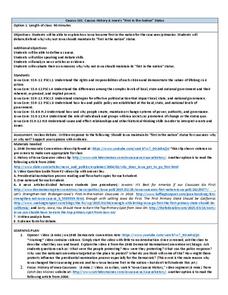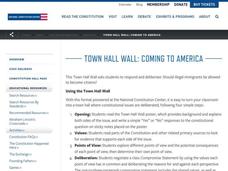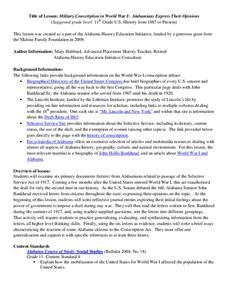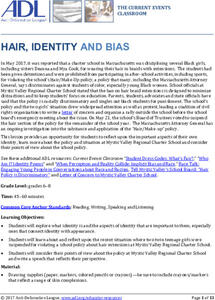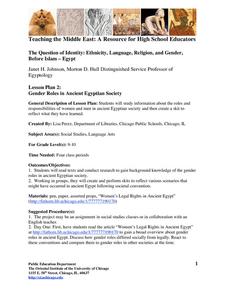Caucus 101
Caucus History and Iowa’s “First in the Nation” Status
What is a caucus? Why is Iowa's first? Why did Iowa shift to the caucus format? After researching these basic questions, class members debate the question of whether or not Iowa should maintain its "first in the nation" status for caucuses.
National History Day
Challenging the Status Quo: Women in the World War I Military
Why are some so resistant to change? The status quo is often to blame for a lack of forward movement in society. Following the events of World War I, women in America suddenly had a voice—and were going to use it. Scholars use the second...
Alabama Department of Archives and History
Alabama's 1901 Constitution: What Was at Stake?
Who should be able to vote? As part of a study of the 1901 Alabama Constitution, class members examine primary source document that reveal the reasons the authors gave to support their positions on this question and their assumptions in...
Lehigh University
Glory (1989) - Should it be Shown in Class?
This is a fantastic activity that prompts learners to think like educators and consider the value of a historically based film beyond just the accuracy of information. Your young historians will work in groups to do a close reading and...
American Evolution
Virginia Runaway Slave Ads
What does an ad reveal about a culture, or about the values of its intended audience? Class members examine a series of runaway slave ads—one of which was written by Thomas Jefferson—and consider what these primary source documents...
Advocates for Human Rights
Refugees and Asylum Seekers
To gain a deeper understanding of the plight of refugees and asylum seekers, class members read stories written from the point of view of an emigrant, map the individual's journey, and note the human rights affected by each stage of the...
National Constitution Center
Town Hall Wall: Coming to America
Everyone seems to have an opinion on the status and rights of illegal immigrants. Help secondary learners research each perspective and arrive at their own conclusions with a collaborative exercise. As they read an informative passage...
Constitutional Rights Foundation
Special Order 40
The city of Los Angeles' 1979 Special Order 40 states: "LAPD officers shall not initiate police action with the objective of discovering the alien status of a person." After reading a fact sheet that details the history of Special Order...
Alabama Department of Archives and History
Alabama Slave Codes in 1833: What They Can Teach Us About Slaves Themselves
After viewing a short PowerPoint about Nat Turner's rebellion, class groups examine Alabama's 1833 slave codes. Individuals then develop a mini-legal brief arguing against one particular slave law.
Museum of Tolerance
Why is This True?
Are wages based on race? On gender? Class members research wages for workers according to race and gender, create graphs and charts of their data, and compute differences by percentages. They then share their findings with adults and...
C-SPAN
How A Bill Becomes A Law
Seven steps are required for a bill to become a United States law. The Families First Coronavirus Response Act (H.R. 6201) is used as a model for the process of how a bill becomes a law. Class members work independently through a Google...
Defining US
Integration of Education and American Society
How did the struggle for Civil Rights during the 1950s transform American society and politics? Why are American schools integrated today? Class members explore these essential questions by examining a series of primary and secondary...
School Improvement in Maryland
Supreme Court Case Overview I
As part of a study of the 14th Amendment to the United States Constitution, class members examine four Supreme Court decisions—Gitlow v. New York, Mapp v. Ohio, Gideon v. Wainwright, and Griswold v. Connecticut—that incorporated the due...
University of California
Impact of the California Missions on Native Americans
While the Spanish claimed to bring civilization to California indigenous peoples, in reality, they also brought violence and forced assimilation to European values. Primary sources, such as the reports of Catholic priests and Europeans...
Alabama Department of Archives and History
Military Conscription in World War I: Alabamians Express Their Opinions
If called, would you go? Should the US government have the power to impose a draft during any war? The Selective Service Act of 1917 (aka the Conscription Act of 1917) authorized the drafting of men into the military for only the second...
School Improvement in Maryland
Immigration Legislation
What is the purpose of immigration legislation? How has this legislation evolved over the years? What are the factors that caused these changes? Class members research immigration legislation to determine whose rights the laws are...
Center for History and New Media
A Look at Virginians During Reconstruction, 1865-1877
The transition between rebellion to reunification was not smooth after the Civil War. Young historians compare primary and secondary source documents in a study of the Reconstruction era in Virginia, noting the rights that were not...
Advocates for Human Rights
Undocumented Immigrants
Stay or go? As part of a study of immigration and human rights, class members listen to the stories of several immigrants and must decide if the story was their own if they would stay in the United States as an undocumented immigrant or...
Wisconsin Department of Public Instruction
RETHINK: Bullying Prevention Curriculum
Adopt a school-wide approach to bullying prevention guided by a program packet that is designed to engage the full school, families, and the entire community. Participants are asked to consider the roles power, control, and privilege...
Encyclopedia Britannica
Presidential Electability
There are specific constitutional requirements that candidates must meet to become president of the United States. In addition, there are societal opinions that affect a candidate's electability. Class members examine historical...
Florida Department of Health
Nutrition: Developing Healthy Habits Unit
The focus of the fourth unit in the Youth Risk Behavior Survey Curriculum is on healthy eating and exercise. Class members examine healthy habits data from the YRBD Youth Online Tool, learn about the importance of a healthy diet and...
School Improvement in Maryland
Smart Growth
New roads, new businesses, new developments, new mass transit systems. All growth has both positive and negative effects on communities. Government classes investigate the principles of Maryland's 1997 Smart Growth program and the...
Anti-Defamation League
Hair, Identity and Bias
Middle schoolers weigh in on dress codes, specifically those that apply to hair and make-up, with a lesson that uses a 2017 case from a charter school in Massachusetts. Class members read about two girls suspended for violating the...
University of Chicago
Gender Roles in Ancient Egyptian Society
After reading about the legal status of women in the Old Kingdom of ancient Egypt and doing some additional research, your young historians will work in groups to develop short skits that reflect a typical gender-role related scenario...


